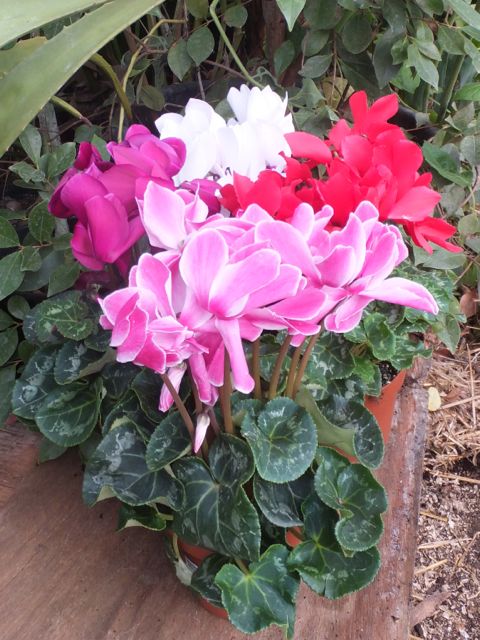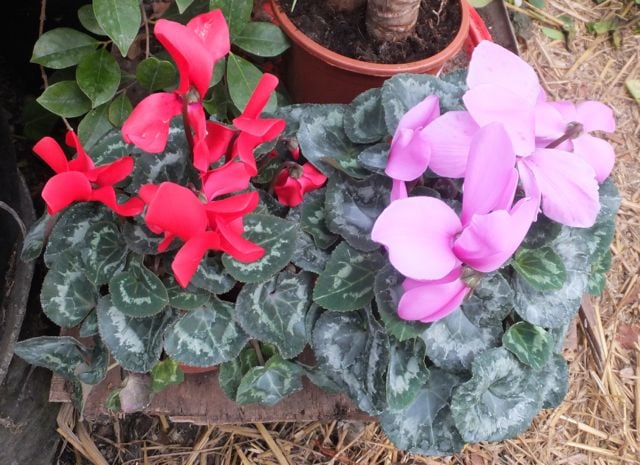A cool frost free glasshouse is perfect for this house plant from the Mediterranean loved since Classical times. Cyclamen is the original Greek, name for this genus of a dozen or so native to Europe and North Africa.
One of the Primrose family these have bulbous corm like tubers, masses of remarkably attractive variegated leaves, and sculpted flowers of breath-taking beauty standing above on perfect stems. Many even have scent as well.
Some smaller bloomed species are quite hardy and easily grown in semi-shady spots such as woodlands edge. However the relatively huge flowered Cyclamen of commerce are hybrids of a tender species C.  persicum (wrongly held to come from Persia really from the eastern Mediterranean). Sadly although this species has scent in the original form this has been lost in the quest for larger more impressive flowers in a wider range of vibrant colours. This is now so literally named C. persicum giganteum.
persicum (wrongly held to come from Persia really from the eastern Mediterranean). Sadly although this species has scent in the original form this has been lost in the quest for larger more impressive flowers in a wider range of vibrant colours. This is now so literally named C. persicum giganteum.
Still, even without scent these hybrids are well worth cultivating for their floral display is hard to beat and lasts many weeks. And before and after their compact foliar display is neat and also attractive.
Now Cyclamen can be grown from seed but are cheap enough to buy as they come into bloom and discard after. And this can cover more than half the year. But it is satisfying to keep them going year after year with the ‘corm’ and thus the display getting bigger and bigger.
Cyclamen are not fussy about compost as long as it’s well drained. They like light but not hot sun so are best on the shadier side of the glasshouse or as an under-storey to larger plants. Although sold as house-plants they’re not that suitable finding our homes too constantly hot and dry, they do best on a windowsill as this gives them cool days and colder nights which they prefer.
Cyclamen are not particularly prone to pests except vine weevils and need little attention so are very low maintenance plants. But you must take extreme care with their watering. Never water from above only ever by standing their pots in a saucer for half an hour and no more! Failure to observe this will become rapidly apparent!
Careful watering in saucers keeping the compost well moist from spring till autumn and just moist through winter, with a little fertiliser in summer, is all that is required. Older plants can be re-potted in early summer and spend it outdoors in partial shade till brought in again in autumn. Please ignore any advice about dormancy and drying off through summer as the tubers MUST be kept just moist at all times.
fertiliser in summer, is all that is required. Older plants can be re-potted in early summer and spend it outdoors in partial shade till brought in again in autumn. Please ignore any advice about dormancy and drying off through summer as the tubers MUST be kept just moist at all times.
Collectors can amass a large collection without even starting on the species because there are so many modern hybrids, and of course new ones can be grown from seed (which is not difficult if slow).
And if you grow too many you could start a pig farm. For although poisonous to us the old name is Sowbreads as pigs relish them, pork from the French region of Perigord are said to have a unique flavour from eating them in their diet.










